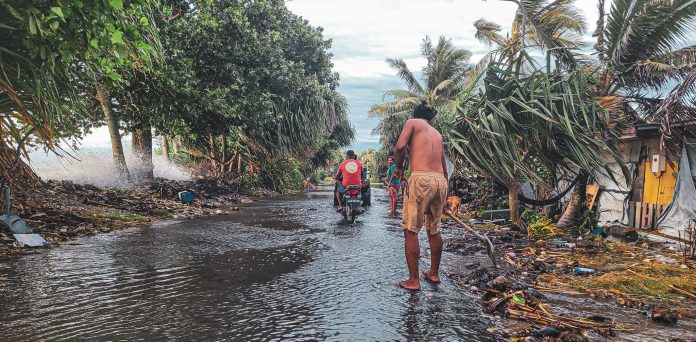Climate change affects every facet of life for Pacific islanders, and for Tuvalu which is one of the most vulnerable countries to the impacts of climate change, it is no different.
The risks to health and disaster management posed by climate change were discussed during the second day of a series of stakeholder workshops held in Funafuti this week.
The stakeholder workshops are being organised under the Tuvalu National Adaptation Plan (NAP) Project which is implemented by the Secretariat of the Pacific Regional Environment Programme (SPREP) in partnership with the Commonwealth Scientific, Industrial, and Research Organisation (CSIRO), GHD Consulting, and the Tuvalu Department of Climate Change.
Representatives from the health and disaster management sectors were presented with the preliminary key findings of the Climate Impacts, Vulnerability, and Risk Assessment (CIVRA) study carried out by CSIRO and Deloitte, which identified the risks to the respective sectors posed by climate hazards and hazard-induced impacts.
“Conducting climate change risk assessments will allow us to prioritise adaptation options as we can’t put all our money into everything at once,” said Dr Fahim Tonmoy, Director of Climate Change and Sustainability at Deloitte.
For the Disaster Management sector, the dominant hazards identified by the study are tropical cyclone-induced storm surges and coastal inundation from king tides. Increased frequency of these hazards will result in an increase in demand for emergency services as there is a high community vulnerability to natural disasters.
Climate projections suggests that the frequency of Category 4 and Category 5 tropical cyclones may increase, which will increase the demand for emergency services and evacuation centres, which are also affected by coastal inundation from king tides and storm surges.
There is currently a Moderate risk to the demand for emergency services, while evacuation centres are facing a Major risk, due to 24 of 56 evacuation centres currently being exposed to flooding from a one in five-year coastal inundation event. This exposure already threatens the health and safety of the communities, particularly during a tropical cyclone.
These risks are projected to increase in 2030 as continued sea level rise and the increase in intensity of tropical cyclones continue to drive coastal inundation. The risk is likely to significantly increase in 2050 for emergency services as hazards may cause widespread destruction and damage due to these projected changes in sea level.
Droughts are also hazards that pose a risk to the disaster management sector. The duration of extreme droughts in Tuvalu are projected to decrease but will happen more often. In recent years droughts have triggered a natural disaster in Tuvalu as it caused significant loss in agricultural productivity and stress on community health, livelihoods and wellbeing.
For the health sector, the quality of groundwater in Tuvalu is a critical factor, as it has impacted by saline intrusion arising from a combination of factors including extreme sea level events and long-term sea level rise. This issue of low quality groundwater was identified as a dominant hazard to public health, along with extreme temperature and frequent heat waves.
Increased temperature and excessive rainfall y provide ideal conditions for the spread of infectious and vector-borne diseases. Heatwaves can result in the increase in number of heat-related medical conditions such as heat rash, heat stroke, and dehydration.
The risks to health infrastructure and access to healthcare services are also significant, with sea level rise and coastal inundation affecting healthcare facilities which are situated in low-lying areas, making them vulnerable to damage and destruction.
These findings were presented to representatives from the respective sectors, where they were encouraged to give their initial feedback on the identified hazards and hazard-based impacts and the associated risks. This information will then be used to finalise the CIVRA, which will then inform the development of the Tuvalu NAP.
This is the second day of a three-day series of stakeholder workshops where the findings of the CIVRA was presented. A national workshop was held Wednesday 27 March, where the findings of the study was shared with other government departments, civil society, and non-governmental organisation.


















